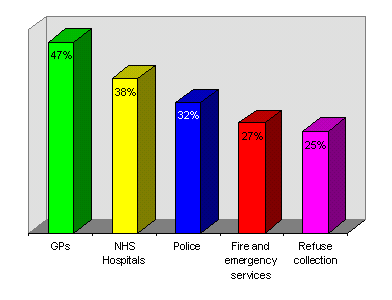People's Panel Up And Running - First Results Published
 |
|
 |
 |
Minister for the Cabinet Office, Dr Jack Cunningham, today published the results of the first wave of research by the People's Panel - the world's first national panel, set up as a cross-public sector research resource into the effectiveness of government services.
Dr Cunningham said:
"The People's Panel will facilitate co-ordinated government research and help us to ensure that public services are developed in the way people want.
"I am delighted to announce that over 5,000 people, selected at random from across the UK, have been recruited to the panel. They will continue to be consulted, via surveys and other methods, to help generate ideas on how services in the public sector can be improved.
"This will form an important part of the wider programme to modernise government and make services more responsive to users."
Commenting on the Panel's first wave of results Dr Cunningham added:
"First results from the Panel show that there have been some improvements in public services over the last few years, and on balance more people are positive about our public services than are negative. But there is considerable need for the better performance people are entitled to.
"The second wave of research is now under way, and the third wave will take place in the new year.
"The Panel is open to all publicly-funded bodies, and we hope that they will use it. Several departments have submitted bids to use the Panel and we will be co-ordinating these carefully to ensure that the Panel is being used to best effect. I have set up a cross departmental steering group to ensure that this is the case."
Key findings from the first wave of People's Panel research include:
- half the Panel think our public services are what they would expect; 40% think that they fall slightly or a long way short of expectations
- most people think services have either got better (24%) or stayed the same (38%) over the last five years; a third think they have got worse
- more people think our public services are friendly, hard working and keen to help than think they are faceless, infuriating or unresponsive
- the Post Office, local electricity companies and GPs top the satisfaction ratings, while road and pavement maintenance is the worst regarded public service
- strong support (77%) for being able to contact government services by one-stop telephone call centres
- but call centres must have a real voice: 9 out of 10 people thought it was very or fairly important that a person should answer rather than getting a recorded menu of options
Dr Cunningham said the advantages the People's Panel offered the public sector included:
- resources - saving resources through co-ordinating aspects of departmental research and sharing information
- tracking - an ability to track how people's views are changing over time
- accessibility - providing a ready resource for consultation, allowing samples (whether of users or non-users of services) to be accessed easily and quickly
- cross-cutting - providing an ideal vehicle for examining cross-cutting issues to find gaps in service provision
- role model - raising the profile of government and public sector research and encouraging others to follow suit in consulting their users.
The top five public services that people feel are the most important to them are:

Cabinet Office press notices are available on the World Wide Web at http://www.nds.coi.gov.uk/coi/coipress.nsf
A summary of results of the first wave of research by the People's Panel are published on the Service First Unit web site at http://www.servicefirst.gov.uk/ppresults_summary.htm.Download the full top-line results of the People's Panel in Word for Windows 6.0 or Mac 5.x format - 47 pages, 516K
-->Technical details
MORI recruited 5,064 People's Panel members aged 16+ in 714 sampling points across the United Kingdom. The sample was based on a two stage design; a random selection of pairs of EDs, stratified by region; within each ED (Enumeration District) a systematic random sample of addresses was taken from the Postal Address File (PAF) Small User File. Interviews were carried out face-to-face, in home, between 20 June and 30 September.
Final data are weighted by age within sex, social class, tenure, work status, Government Official Region, car ownership, household composition and MOSAIC.
Data based on all unless otherwise stated. Where figures do not sum to 100 per cent, this may be due to computer rounding, multiple codes or the exclusion of 'Don't know'. An asterisk '*' represents a figure greater than zero, but less than 0.5%. Where bases are below 30, absolute figures are given rather than percentages.



